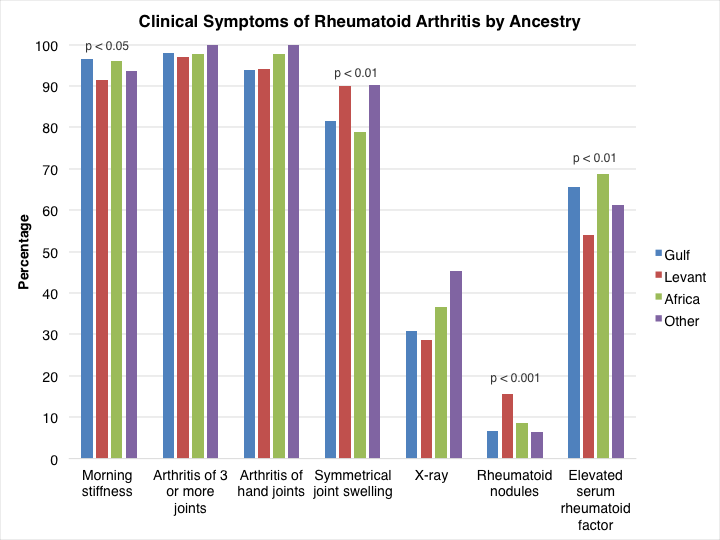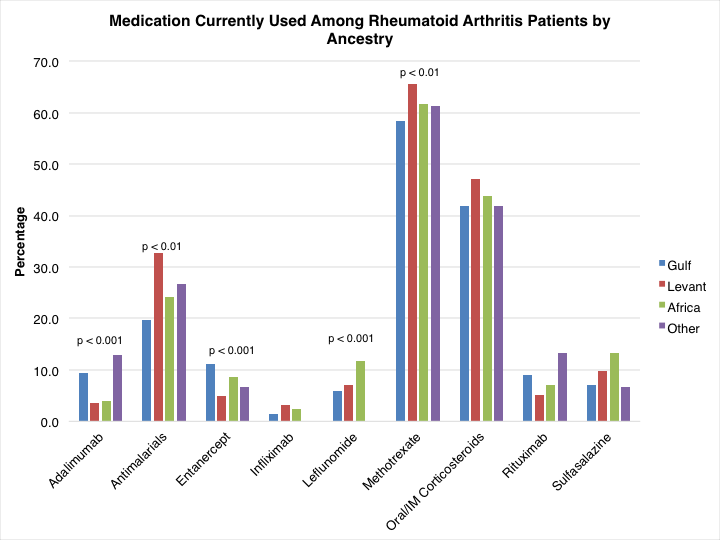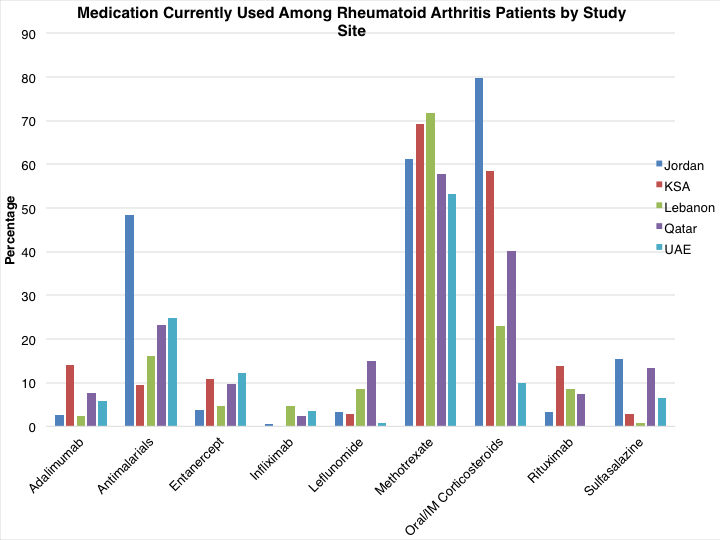Session Information
Session Type: ACR Poster Session B
Session Time: 9:00AM-11:00AM
Background/Purpose:
Data on the
clinical and genetic characteristics of Arab patients with Rheumatoid Arthritis
(RA) is limited. Our aim is to report on the clinical manifestations of the
first 844 patients recruited into “The Genetics of Rheumatoid Arthritis in some
Arab States (GRASS) study”.
Methods:
GRASS is a
multicenter case-control study that aims to study the clinical and genetic
characteristics of patients of Arab ancestry. Subjects were recruited from 5
centers in Jordan, Kingdom of Saudi Arabia (KSA), Lebanon, Qatar and the United
Arab Emirates (UAE). To be eligible for enrollment, subjects had to be 1) of
Arab ancestry by self-report, 2) be > 18 years of age. Cases had to be
diagnosed as per the 1987 ACR RA criteria. Controls were eligible if they did
not have RA or autoimmune disease. Ancestry, demographic, lifestyle, clinical
and treatment data was collected via an on-line questionnaire by interviewing
the subjects and retrieving information form the medical records. Ancestry was
classified into 3 categories as Gulf, Levant or North Africa, when 3 or more
grandparents were from the same region. Subjects, which did not fall under
those categories for ancestry, were classified as “Other”. Data were analyzed
using Pearson Chi Square and Fisher’s Exact
tests.
Results:
A total of 844
cases, 718 (85.1%) women and 126 men (14.9%) (F/M: 6/1), were enrolled from
June 2012 to April 2015. The most common age range of diagnosis for both
genders was 30-49(not significant when stratified by study site or ancestry,
p>0.05).
The rates of
CCP positive, RF positive, CCP/RF positive and seronegative
cases differed based on ancestry (p<0.01, excludes the UAE). CCP/RF positive
cases were the most common for all ancestries, with The Gulf (174,62.4%) and
North Africa (63,62.4%) showing an equal rate of CCP/RF positive cases followed
by “Other” (14, 50.0%) and the Levant (48.3). The Levant (77, 26.2%) and
“Other” (7, 25.0%) showed a higher rate of seronegative
cases than the Gulf (38, 13.6%) and North Africa (15, 14.9%).
Medication
use:
Conclusion:
The clinical
characteristics of RA and its medical management differ between Arabs of different
ancestries found in the Arab region. These differences must be further explored
in the context of genetic factors and the influence of GDP on medication use.
To cite this abstract in AMA style:
Bayoumy K, Roger Dargham S, Elhaq W, Al Emadi S, Hammoudeh M, Masri B, Halabi H, Badsha H, Uthman I, Mahdy S, Plenge R, Saxena R, Kapiri M, Arayssi T. Clinical Characteristics and Medication Use Among Arab Patients with Rheumatoid Arthritis in Some Arab States [abstract]. Arthritis Rheumatol. 2015; 67 (suppl 10). https://acrabstracts.org/abstract/clinical-characteristics-and-medication-use-among-arab-patients-with-rheumatoid-arthritis-in-some-arab-states/. Accessed .« Back to 2015 ACR/ARHP Annual Meeting
ACR Meeting Abstracts - https://acrabstracts.org/abstract/clinical-characteristics-and-medication-use-among-arab-patients-with-rheumatoid-arthritis-in-some-arab-states/



